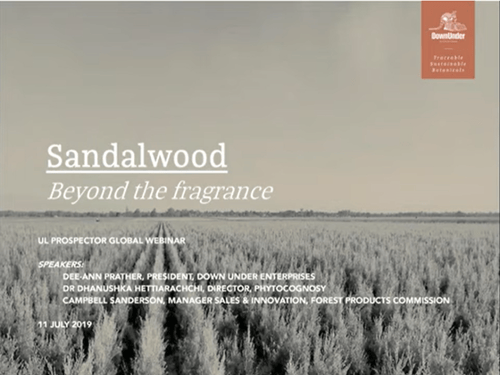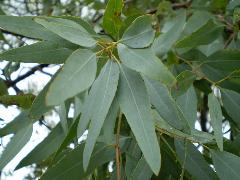Down Under Enterprises grows, produces, exports, and markets traceable
and sustainable native Australian essential oils and botanicals grown on our farm, Buhlambar, and from across Australia producing essential oils and botanicals with unique functional and aromatic properties.
G’day mate,
Welcome to our March newsletter for 2023!
This month we demystify the functional benefits of natural Sandalwood Oil, both Australian Sandalwood and Sandalwood Album. We detail why these oils are so precious, from their historical significance to their present-day usage.
For centuries, Sandalwood has held strong significance across many cultures, from Ayurvedic to the Aboriginal Australian. In a modern world facing macroeconomic challenges, the demand for mental health and wellness-focused products is rising, and the benefits of natural Sandalwood Oil meet this consumer requirement head-on.
Today, with an ethical and traceable supply, Australia is the world's source of "safe" Sandalwood, supplying over 85% of the world's demands for this precious wood and byproducts.
In the News this month, the US government's Lacey Act continues its focus on protecting at-risk species, including combating the illegal trading of Sandalwood.
More in this issue:
- Natural Sandalwood's sedative properties
- Natural Sandalwood's ability to arouse
- The fixative properties of natural Sandalwood
- Mood benefits from the Central Nervous System
- Sourcing legal Sandalwood
- Sustainable Sandalwood production
- US Lacey Act enters Phase VII
Thanks for reading.

Phil Prather
FEATURED PRODUCT
NEW: "Goblin Mode" - Finding an escape with natural Sandalwood Oil
The Oxford Dictionary word of 2022 is “goblin mode,” which reflects the feeling of hyper-fatigue among many of us as the world returns to “normal.”
With the cost-of-living crisis hitting individuals and households everywhere, consumer patterns are shifting in two main directions. One group is seeking a moment of escape from reality. The other is preferencing products with functional benefits which help overcome physical and/or mental uncertainties in their lives. Cosmetic Business recently revealed the concept, “Stress relief in a jar”, addressing the top 5 trends for skincare in 2023.
41%of US consumers are using more aircare products for wellness benefits such as sleep and relaxation |
82%of Chinese consumers agree that using beauty/grooming products makes them feel good about themselves |
74%of consumers surveyed sensed a direct connection between their mental state and their skin |
69%of those surveyed felt burnt out in the past 12 months, or been in a state of physical and emotional exhaustion due to stress |
|
Beauty, Personal Care & Household – Mintel Global, 2022 Tacha a Unilever-owned company, consumer survey finding, Oct 2022 |
|||
Natural Sandalwood Oil addresses both of these issues head on - whether you want to be relaxed or aroused. Natural Sandalwood Oil, both Australian Sandalwood (INCI: Fusanus Spicatus Wood Oil) and Sandalwood Album (INCI: Santalum Album Wood Oil) offer a sensorial escape with their complex oriental aroma profiles. Natural Sandalwood Oil is well-positioned to meet consumer demand for mental health and wellness-focused products in the face of macroeconomic challenges ( The Future of Fragrance: 2023 - Mintel).
In this month’s Newsletter, we demystify the functional benefits of Sandalwood Oil and explain why it is so precious, from its historical significance to its present-day usage.
Sedative
Stress is widely known to affect skin health.
Natural Sandalwood Oil, proven by traditional medicine and modern science, offers sedative properties that can help reduce anxiety, stress, and nervous tension.
Studies demonstrate that Sandalwood can reduce anxiety and induce relaxation. The calming effects of Sandalwood are attributed to its high content of natural compounds called santalols, shown to have a calming effect on the nervous system. In one study, inhalation of sandalwood essential oil was found to reduce blood pressure and the activity of the sympathetic nervous system, which is responsible for the "fight or flight" response in our bodies that can trigger stress and anxiety (Hoferl et al., 2016). A study published in the Journal of Sleep Research found that natural sandalwood oil was able to improve sleep quality and reduce sleep disturbances in adults with insomnia (Rozance et al., 2016).
Arousal
Uniquely, natural Sandalwood oil was also found to elevate adult volunteers' pulse rate, skin conductance level, and eye-blink rate (Heubege et al., 2006). These studies compared the inhalation of natural Sandalwood Oil with a placebo and a single α-santalol component and found that
|
“the natural Sandalwood Oil control group showed higher overall physiological and behavioral arousal levels. ” – Heubege et al. 2006 |
The authors postulated that the observed difference is attributed to that natural Sandalwood's many naturally occurring active chemical compounds besides the primary α-santalol and β-santalol.


The eye blink rate (EBR) and pulse rate increase and Skin Temperature increase of the Sandalwood Oil group ( Heubege et al., 2006)
Fixative
Amid the current cost-of-living pressures, consumers need a reason to invest in fragrances; however, "value" need not always be about low-cost ingredients. The long-lasting benefits of Sandalwood as a multifunctional ingredient in formulated products have opportunities to attract money-conscious consumers.
 |
 |
| P&G successfully relaunched the Old Spice brand, containing real Sandalwood Oil to increase value. Recent brand extensions include Head & Shoulders shampoo with real Sandalwood. | |
Natural Sandalwood is known for its fixative aroma. Natural sandalwood oil has a longer shelf life and is less likely to oxidize than synthetic sandalwood analogues, which can degrade over time and lose potency.
The aroma of aged Sandalwood can easily last for years. Forbes India interviewed a former attar maker. “A well-made attar based on sandalwood oil would smell just the same even after 100 years, “That’s why it is valued. It is the base note over which the pyramid of an attar or perfume is structured,” explains former attar maker Pradeep Kapoor.
Wood Oils, in general, have a longer-lasting scent than leaf oils. To explore other wood oils with base note fixative properties, review our Australian Wood Oil Collection.
Down Under Enterprises offers Australian grown, fully traceable and US Lacey Act compliant Sandalwood. Australian Sandalwood INCI: Fusanus Spicatus Wood Oil) and Sandalwood Album (Santalum Album Wood Oil) with key benefits:
BENEFIT 1 – Anxiety relief
BENEFIT 2 – Mood enhancement
BENEFIT 3 – Long-lasting aroma
BENEFIT 4 – US Lacey Act compliant
THE EVIDENCE
Sandalwood: Mood Benefits from the Central Nervous System
Natural Sandalwood Oils (Australian and Album) are highly complex substances with more than 125 chemical compounds that modern science has yet to replicate. Each element in Sandalwood is being researched for its potential benefits and applications, highlighting the uniqueness of Sandalwood. Its properties as both a sedative and arousal stimulant are still not fully comprehended by modern science.
Sandalwood Album contains in excess of 57% santalols, while Australian Sandalwood contains in excess of 15% total santalols. The high concentration of alpha and beta santalols gives Sandalwood its unique characteristics (ISO standards).
Resemble Chlorpromazine
In a study conducted in 1995, both α-santalols and β-santalols demonstrated significant sedative and analgesic effects, as determined by increased levels of homovanillic acid, 3,4-dihydroxyphenylacetic acid, and/or 5-hydroxyindoleacetic acid in the brains of mice (Okugawa et al., 1995). The study found isolated α-santalols and β-santalols may be considered neuroleptic by the resemblance of this response to chlorpromazine, which is an antipsychotic and sedative medication.
Physically Sedative, Yet Mentally Arousing
A single-blind clinical study conducted on healthy human volunteers by transdermal application of Sandalwood Oil observed an uncoupling of physiological and behavioral arousal parameters. Subjects were assessed physiologically for blood pressure, pulse rate, and behavioral parameters of attentiveness and eye blinking. The authors observed a decreased physiologic activity and an increase in arousal compared to the control group (Hongratanaworakit et al., 2004).
Australian Sandalwood More Effective in Relieving Stress
Researchers from the University of Vienna (Hoferl et al., 2016) examined the stress responses of 32 individuals using different types of essential oils such as Lavender (Lavandula angustifolia), Indian Sandalwood (Santalum album), and Australian Sandalwood (Santalum spicatum). In the experiment, inhalation of all three oils reduced the salivary cortisol concentration level. However, the Australian Sandalwood cohort reacted 10 mins faster than the other groups. Australian Sandalwood essential oil elicited a considerably lower systolic blood pressure response compared with the control (P = 0.005). The results showed Australian Sandalwood was more effective than the other oils in reducing physical indicators of stress, demonstrating Australian Sandalwood Oil's stress-relieving potential.
Anti-Neuroinflammation
In a recent in vitro study published in Phytotherapy Research (Suganya et al, 2020), Sandalwood Album extract offered significant anti-neuroinflammatory properties. The study used human neuroblastoma cells and found that the extract reduced the expression of proinflammatory cytokines/chemokines in a dose-dependent manner. These data indicate the potential of Sandalwood in modulating neuroinflammation, which plays a significant role in the development and progression of neurodegenerative diseases. The study also found that Sandalwood extract increased the expression of IFN-β and IFN-α in neuroblastoma cells. Neuroinflammation is a critical factor in developing and progressing various neurodegenerative diseases, like Alzheimer’s disease and Parkinson's disease.  For more published evidence on the therapeutic properties of Sandalwood, including antimicrobial, anti-protozoan, antiviral, reduced skin inflammation, and reduced acne, please download our Whitepaper of Therapeutic Properties of Sandalwood or watch our Sandalwood Webinar with UL Prospector: Sandalwood – Beyond the fragrance
For more published evidence on the therapeutic properties of Sandalwood, including antimicrobial, anti-protozoan, antiviral, reduced skin inflammation, and reduced acne, please download our Whitepaper of Therapeutic Properties of Sandalwood or watch our Sandalwood Webinar with UL Prospector: Sandalwood – Beyond the fragrance

TRACEABILITY
Australia, the World’s Source for Legal Sandalwood
Sandalwood, particularly Indian Sandalwood (Santalum album), has been identified as a “Redlist” vulnerable species by the World Conservation Union's Threatened Species since 1994. Unfortunately, this hasn’t stopped the uncontrolled harvesting and destruction of sandalwood forests due to the high value of the tree.
In India, it’s estimated that 90% of Sandalwood Album is from illegally harvested means (Thomson et al., 2021).
In Eastern Africa, organized crime syndicates facilitated the rise of illegal Sandalwood Oil from that region to meet growing global demand. United States Ambassador to Kenya, Margaret Whitman, shared in her speech on February 28, 2023, that the United States and Kenyan law enforcement partnered to tackle the illicit trade of Sandalwood in eastern Africa.
 The 13.5 tonnes of Sandalwood seized in Samburu County burned at the Directorate of Criminal Investigations (DCI) headquarters in Nairobi on February 28, 2023. | PHOTO: @USAmbKenya/Twitter
The 13.5 tonnes of Sandalwood seized in Samburu County burned at the Directorate of Criminal Investigations (DCI) headquarters in Nairobi on February 28, 2023. | PHOTO: @USAmbKenya/Twitter
Australia now produces over 80% of the world’s legally harvested Sandalwood. While the Western Australian government has managed the supply of sustainable Australian Sandalwood (Santalum spicatum) for decades, large “Indian” Sandalwood (Santalum album) plantations in Australia commenced in the early 2000s with commercial oil production commencing in the last five years. Combined, these Australian plantations and management programs provide the world with a sustainable and traceable supply of Sandalwood.
Interestingly, the top 3 importers of Sandalwood from Australia are India with 244 shipments, followed by Singapore with 11, and the United Arab Emirates with 10 shipments. (Volza, November 22 2022)

For more than 20 years, Down Under has worked closely with our Australian Sandalwood growers, eliminating the legal risk and ensuring a regular supply of high-quality Sandalwood Oil to our global clients.
Down Under offers customers a traceable and sustainable source of Sandalwood Oil, complying with ISO3518:2022 (S. album) and ISO22769:2022 (S. spicatum), with the comfort of knowing your Sandalwood Oil is produced with 100% compliance with the US Lacey Act.
Download a sample copy of our Lacey Act Compliance Declaration document, or speak to your local Down Under sales rep.

FARM UPDATES
Planting more Lemon Scented Iron Bark
Our December 2022 plantings of Lemon Scented Iron Bark Oil (Eucalyptus staigeriana) are growing well. This unique Australian essential oil offers a rare combination of Linalool and Citrals, offering amazing “extender” potential for citrus-based aromas and formulations. These plants will have their first harvest later this year on our Buhlambar Essential Oil Farm, in Australia.


SUSTAINABILITY
Regenerative Sandalwood Farming and Distilling
Sandalwood Oil is a relatively expensive Essential Oil due to the extended growing time and the lengthy Sandalwood distillation process.
Sandalwood trees require over 15 years to mature. They are hemiparasitic, meaning they can only grow successfully when attached to a suitable host tree, which they rely upon for water and nutrients. When harvesting, the whole Sandalwood and the host tree are uprooted together.
Sandalwood growers have significant upfront investments, typically 18+ years of farm risks (weather, irrigation, pests), before they harvest the trees and then commence preparations to start the whole process over again. A lot of patience is required.
Sustainably Farmed Sandalwood
Harvesters of Australian Sandalwood (Santalum spicatum) are required to conform in all respects to the environmental and operational requirements as controlled by the Western Australian Government's Forest Products Commission (FPC) to maintain a sustainable harvesting operation. The FPC regulates the conservation, harvesting, and replanting of this native resource. As part of the FPC regeneration program each year, more than five million sandalwood seeds are planted across approximately 20,000 hectares of land, ensuring a sustainable supply of Australian Sandalwood, lasting well into the future.
Sustainably Distilled Sandalwood
Essential oil distillation is a process that can use a lot of energy and water. The Sandalwood Album distilling facility uses hydroelectric power from a nearby river in Western Australia. They have also deployed a patented invention – a continuous distilling process – which can reduce about 75 percent of the energy and water requirements, as compared with the traditional batch processing method.
Trialing Biochar Carbon Capture
Subscribers to our Newsletter might remember the biochar process employed in the production of our Eucalyptus Kochii and Eucalyptus Yandee Oils to reduce carbon emissions and recycle the wastes for fertilizers and renewable energy sources.
Read more about Biochar in our recent blog.
Our Sandalwood producer is currently trialing turning the biomass from their host trees into biochar. Biochar contains high levels of carbon and other nutrients, making it a beneficial soil amendment. It can improve soil fertility, increase water retention, and enhance plant growth.
Click to read more about the History of Sandalwood in Australia.
IN THE NEWS
US Lacey Act moving to Phase VII
In October 2021, Phase VI of the US Lacey Act heralded the addition of Sandalwood to the list of protected species which places full legal liability of the entire supply chain prior to import of the substance upon importers to the United Stated, including within formulated products.
The US Animal and Plant Health Inspection Service (APHIS) announced in January 2023 that it’s preparing for Phase VII, the next stage of the declaration requirement of the US Lacey Act. Starting in 2023, APHIS will release a list of affected HS codes in the Federal Register, and declarations will be mandatory for those product codes 6 months after publication. The Lacey Act declarations will also be required for all non-composite plant product Harmonized Schedule (HS) codes. This implies that various imported products, including Essential Oils, and other products like cork and furniture, which have never required Lacey Act declarations before, will now need them.
Any person importing products to the United States who violates the Lacey Act declaration requirement could be subject to civil and criminal penalties of up to 5 years in prison and a fine of $500,000 or twice the gross gain or loss, in addition to forfeiture of subject goods. There is no innocent owner defense when the plant or plant product subject to forfeiture is contraband or otherwise illegal under the law. In the fiscal year 2022, APHIS initiated 29 cases, issued 15 official warnings, and collected 11 cases of settlement penalties.
Talk to Down Under Enterprises about how to your risks to obtain Lacey Act compliant Sandalwood.

MY FAVORITE OIL
Fragonia®
Our featured video on Fragonia® Oil was our most viewed video in last month’s Newsletter.
If you missed it last month, come along with our founder, Dee-Ann, who takes you for a virtual tour on our farm to learn about this fascinating “female-oriented” essential oil.



